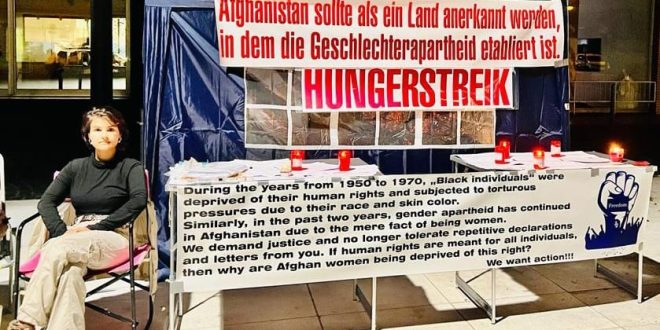AT News
KABUL – A group of Afghan women activists residing in Germany has initiated a hunger strike, marking its third day today, to protest the severe restrictions imposed on women and girls by the Taliban in Afghanistan.
The activists, who have taken to social media to raise awareness about their cause, released a video decrying what they have termed “gender apartheid” in Afghanistan. They are calling for global recognition of the dire situation faced by women in their homeland.
Tamanna Zaryab Paryani, a prominent women’s rights advocate among the hunger strikers, declared, “This protest is our response to the ongoing terrorism in Afghanistan. We demand the immediate recognition of the gender apartheid that persists in the country.”
Paryani emphasized that they are committed to continuing the hunger strike until September 12, as they aim to draw international attention to their cause. The women activists are demanding cessation of the gender apartheid in Afghanistan, an end to the world’s financial support and official visits to Taliban officials and the immediate release of activists, journalists, and members of civil society who have been detained by the Taliban.
In a joint statement, the hunger strikers called upon the people of Afghanistan to raise their voices against the injustices being perpetrated against women and urged the international community to take decisive action in response.
Meanwhile, Richard Bennett, the United Nations Special Rapporteur for Human Rights in Afghanistan, expressed deep concern over the “appalling” restrictions that the Taliban has imposed on women and girls in the country. During an interview with Amu TV, Bennett stressed that no country would recognize Afghanistan under Taliban rule if women continued to endure discrimination.
Bennett lamented the more than 60 decrees implemented by the de facto Taliban authorities, which have severely curtailed the rights of women and girls throughout Afghanistan. He argued that these restrictions not only have dire consequences for the future of Afghanistan but also inflict economic and psychological harm on half of the population.
Furthermore, Bennett condemned the Taliban’s limitations on education, employment, and women’s mobility as “unacceptable.” He emphasized that these restrictions must be overturned to ensure a brighter future for Afghanistan and its women.
 Afghanistan Times
Afghanistan Times




